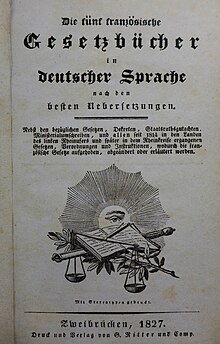Cinq codes

The five French law books in German according to the best translations, Zweibrücken, Georg Ritter , 1827, 18.5 × 11.5 cm, Zweibrücken City Museum; The French legislation was introduced in Germany on the left bank of the Rhine in 1804.
Cinq codes (“five codes of law”) are five French codes that go back to the initiative of Napoleon . In French they are also known as Napoleonic Codes (“Napoleonic Law Books”).
Law books
The five French codes are:
- Code civil (Civil Code, 1804), entered into force as Code civil des Français ; 1807-1815 was officially again 1852-1871 as Napoleonic Code referred
- Code de procédure civile (civil procedure book, 1806)
- Code de commerce (Commercial Code, 1807)
- Code d'instruction criminelle (Code of Criminal Procedure, 1808)
- Code pénal (Criminal Code, 1810) was completely revised in France in 1994
Applicability in Germany
Many of the Rhine Confederation states under French influence introduced the “Cinq codes” in the years after 1806. After Napoleon's defeat, the “Cinq codes” initially continued to apply, particularly on the left bank of the Rhine . For example, the Civil Code in the German Reich was not replaced by the Civil Code (BGB) until 1900, where it was still in force.
literature
- Johann Cramer (Ed.): The five French law books: with opposite German translation by a practical lawyer . (Basic work: Code civil. Code de procédure civil. Code de commerce. Code d'instruction criminelle. Code pénal [1854]) . Koblenz, Bädeker [circa 1855].
- Franz Wieacker : History of private law in modern times with special consideration of the German development. Vandenhoeck u. Ruprecht, Göttingen 2nd edition 1967, pp. 322–347 (342 ff.).
Individual evidence
- ↑ Uwe Wesel: The five books of Bonaparte , Die Zeit, February 17, 2010